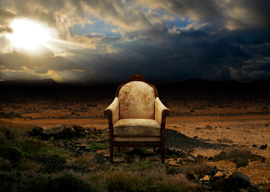
September 15, 2012

Despite all the resources now at our command, we do not wish to be informed. Jefferson saw that our system would fail without an educated electorate. We take the media as gospel, or at least those parts that reinforce our greatness in our own minds. We despise all traditional fonts of authority, preferring the flattery of demagogues.
Classical education, while doubtless sexist, racist, and speciesist, imparted its graduates with more than knowledge of Latin and Greek. It taught critical thinking, lent historical and literary depth to one’s judgment, and gave one the mental discipline and desire to learn other things”which is the reason college graduation is called “commencement.” With those tools, such folk who went into government, the military, and any other endeavor requiring leadership tended to have stamina and adaptability.
Compounding our problems is the almost universal confusion of authority with power. Authority is the right, based upon legitimacy, to say what ought to be done, while power is the ability to make things happen. Traditionally, those in power had to at least pay lip service to the wielder of authority for the right to exercise that power. A shadow of this remains in constitutional monarchies today.
But in modern republics such as our own, the source of authority is “the people” as expressed in the ballot box”a source so diffuse as to be meaningless. Where even Tony Blair had to pretend to humble himself by kissing hands (an action the far more talented Churchill was proud to do), the mob’s attendant adulation upon a candidate’s election reinforces his usually delusional sense of excellence. Power becomes authority, and the ruler is free to alter anything he chooses within his purview”even the nature of marriage or the definition of “human being.” But if the ruler bases his policies on his own mental constructs without regard to reality, it shall crush both him and his people.
We moderns reject aristocracy, insisting that our rulers reflect our ignorant selves, whereas 19th-century workmen dressed elegantly even while digging ditches. The more casual our elites appear, the more we like them, which frees them further from doing anything uncomfortable.
People of any ability today tend to pursue anything other than public service. Perhaps some economic, political, or medical catastrophe will fire up the peoples of the West to demand better leadership. Or it may be that sociological pessimists such as Spengler were right: This is what happens to old civilizations, and ours is dying. But if Spengler is to be proved wrong, leaders and led alike must see that full bellies, sated gonads, and endless entertainment are not enough. The codependency of mediocrity between rulers and ruled must be broken. Otherwise the dour comment of Proverbs will be fulfilled once more: “Where there is no vision, the people perish.” Regardless of how leaders ascend to rule, even those with vision are useless if their people do not share it.
Image of abandoned throne courtesy of Shutterstock